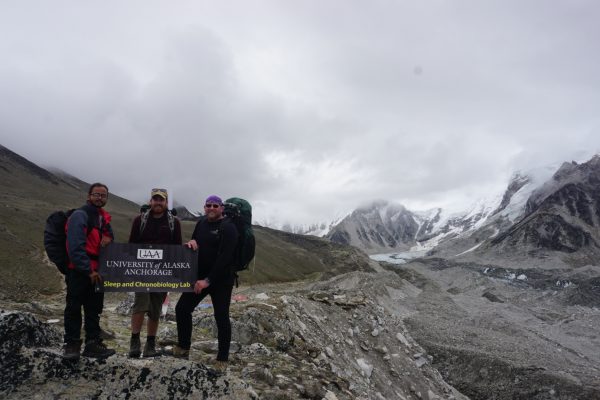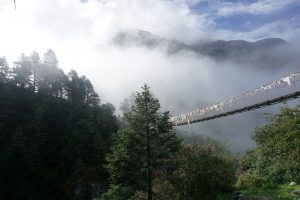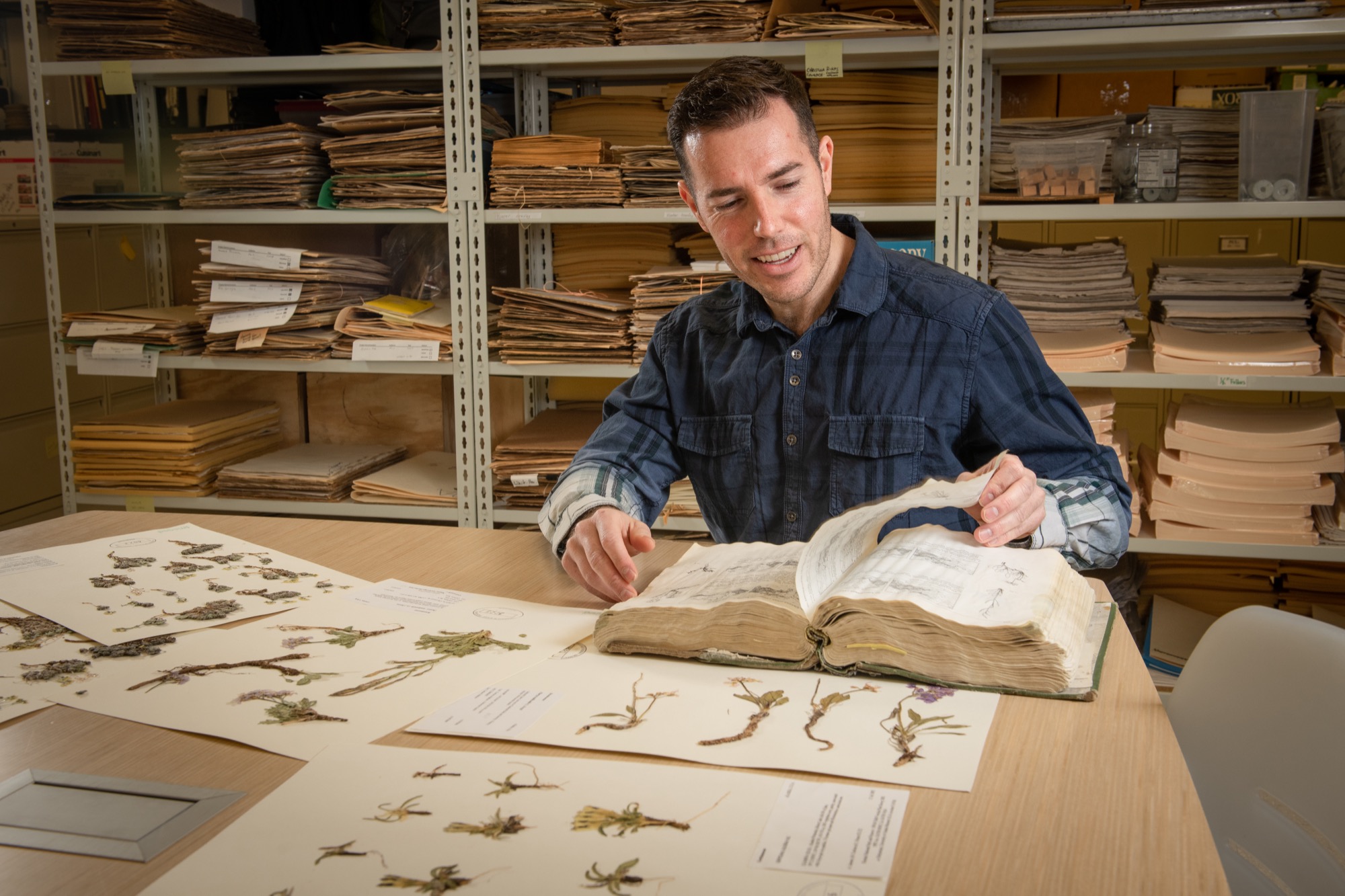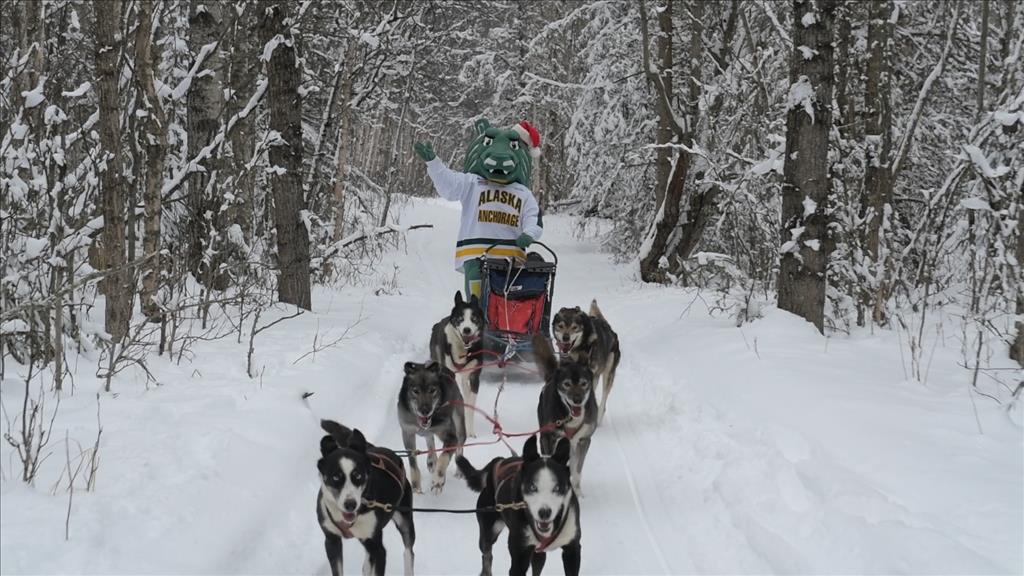Scaling the effects of caffeine on Mount Everest
by Matt Jardin |

Nepal Health Research Council doctor Suman Acharya (left) joins UAA biology professor Chris Jung (center) and MEDEX graduate Rich Wehling (right) on their 15-mile, 6-day hike up to Dingboche, Nepal, to research the effects of caffeine on cognitive function, physical response and sleep physiology at higher altitudes. (Photo courtesy of Chris Jung)
If the slogan is true and Red Bull does give you wings, how high can those figurative wings take you up Mount Everest, the tallest mountain in the world? More specifically, how does caffeine affect our cognitive function, physical response and sleep physiology at higher altitudes? That question piqued the collective interest of UAA's Sleep and Chronobiology Lab, so they decided to find out.
"There really wasn't any recent published research on caffeine in high altitude, which was surprising because caffeine is one of the most widely used drugs around," says UAA English alumna Trina Musliu, who helped kick off the project during her junior year.

Jung at Everest Base Camp in summer 2017, located 8 miles up the mountain from Dingboche. (Photo courtesy of Chris Jung)
Rounding out the other two-thirds of the team is Musliu's then-teacher Chris Jung, Ph.D., assistant professor of biological sciences at UAA and expert on the neuroscience of sleep, and Rich Wehling, another student and eventual teaching assistant for Jung and graduate of the MEDEX physician assistant program.
Coincidentally, the Everest project serves as a follow-up in several ways. It's the second collaboration between Jung and Wehling, who had previously conducted a study on how the changes in the amount of natural light between seasons can affect sleep in the world's polar regions, which is a phenomenon many Alaskans are grappling with this time of year.

Jung at Everest Base Camp in summer 2017, located 8 miles up the mountain from Dingboche. (Photo courtesy of Chris Jung)
Furthermore, this is the second high-altitude study for Jung, who had recently completed similar research on Denali, the tallest mountain in North America. Following that up with a project on Everest just seemed like a natural next step.
In summer 2017, Jung and Wehling flew - via plane, not energy drink-generated wings - to Kathmandu, the capital of Nepal. From there, the duo took an air charter to Lukla, where they began their 15-mile, 6-day hike up to Dingboche. They were accompanied by a pair of local porters and Suman Acharya, a doctor from the Nepal Health Research Council.
Dingboche is a village of approximately 200 inhabitants that sits at an altitude of 14,470 feet. Depending on the route, it's one of the last stops before Everest Base Camp just 8 miles further at 17,600 feet. Thus, climbers and hikers are advised to stay in the village for at least two days so their bodies can acclimate to the drastic change in oxygen levels. Luckily for Jung and Wehling, that recommendation also meant they had a captive audience for their study.

Dingboche is a village of approximately 200 inhabitants that sits at an altitude of 14,470 feet. Depending on the route, it's one of the last stops before Everest Base Camp. Climbers and hikers are advised to stay in the village for at least two days so their bodies can acclimate to the drastic change in oxygen levels. (Photo courtesy of Chris Jung)
"When you pay this kind of money just to be there, no one's there just to hike and come back. They're there to explore. You could be there a week easy and not cover half that peaks that are available," describes Wehling.
Both Wehling and Jung can relate to the need to get their money's worth. While mostly funded by UAA's BUILD EXITO program and the National Institute of Health, a partial balance remained for the two to pay out of pocket.
Testing began first thing every morning. Without a Starbucks on Everest (the closest being an illegitimate one back in Lukla), Jung and Wehling had participants take pills that contained 200 milligrams of caffeine, which equals roughly one cup of coffee. The team also occasionally dispensed placebos, which equals roughly one cup of decaf coffee, obviously.
In order to track participants' physical response to high-altitude caffeine ingestion, Jung and Wehling measured blood pressure and heart rate, once before giving out the pill or placebo and several times after. Participants were also given a questionnaire to measure their acute mountain sickness and subjective sleepiness.
Similarly, Jung and Wehling measured cognitive function by giving climbers and hikers a Stroop test before taking the pill or placebo and again periodically throughout the day. If it's been some time since your last physical, a Stroop test presents participants with a word and requires them to say the color of the word's font rather than the word itself. For instance, say aloud the color of the following word - red. How did you do? Do you need another cup of coffee?
As far as observing sleep physiology, it's mostly how you're imagining it - test subjects sleep with electrical nodes attached to their heads while wired to machines that monitor brain waves, except they're in a camp high up in the mountains instead of a lab.
Field work lasted 30 days. By the end, Jung and Wehling had run tests on 41 participants from 10 countries. The pair had to exclude locals from testing due to their permanent genetic acclimatization to the conditions on Everest.
Ultimately, what the team on the ground, as well as Musliu back home, were trying to determine was whether caffeine is compensatory or synergistic with high altitude. In other words, can the benefits of caffeine, like its ability to strengthen cognitive function, lessen some of the negative effects of high altitude, like tachycardia and tachypnea? Or, will ingesting caffeine at high altitude bring out the worst aspects of both, such as hypertension?
"Both caffeine and high altitude independently have been reported to increase blood pressure, but we hypothesized that caffeine wouldn't be detrimental because of ceiling effects. That is, there won't be an additive effect with the combination of caffeine and high altitude. Cognitive function is impaired at high altitudes, so caffeine could possibly help with that as it does down at sea level," explains Jung.
Nearly a year and a half after conducting field work on Everest and the answers are still coming. Rest assured, Jung, who is assisted by Musliu and joined by student researcher Renee Coker, aren't sleeping on the job. That's just the nature of research analysis, which so far has yielded surprising results.
What has been mostly assessed is the data on sleep, likely due to Jung's own expertise on the subject. What he determined was that for participants who took a caffeine pill, their actual sleep and sleep stages remained unaffected, suggesting a neutral relationship. Sleep duration was shorter on average for those who took caffeine, which Jung notes just creates more questions.
"I didn't expect to see a difference in sleep, I thought the caffeine would have worn off by then," he shares. "It's interesting because it might last shorter because you have a higher metabolism so you might be burning through it faster, or it might last longer because your liver and enzymes that break it down aren't working as great."
"What we've determined is that we get the good effects of caffeine but we don't get the tachycardia, we don't get the headaches, we don't get all the sweating that's associated with caffeine because they're hidden inside the bad effects of high altitudes. But I think we're still a long way off from being totally done," adds Wehling.
What remains to be analyzed are the results pertaining to physical and cognitive responses - so blood pressure, blood oxygen saturation, heart rate and reaction times. Jung describes this research as uncharted territory that can have the most wide-ranging influence. Needless to say, he isn't hitting the snooze button.
"There are over 140 million people who live above 7,500 feet and even more that go up to visit. People that go up from sea level can have some really bad problems there. It could exacerbate their system enough to get a heart attack. So it might be beneficial to tell them to avoid caffeine if we find an increase in blood pressure," he says. "However, if we don't find an increase, then it might be okay to take caffeine and even beneficial to cognitive function without affecting sleep physiology. Right now we're looking at this negative stigma toward caffeine and seeing if there's some credit to it."
Written by Matt Jardin, UAA Office of University Advancement
 "Scaling the effects of caffeine on Mount Everest" is licensed under a Creative Commons Attribution-NonCommercial 4.0 International License.
"Scaling the effects of caffeine on Mount Everest" is licensed under a Creative Commons Attribution-NonCommercial 4.0 International License.
















